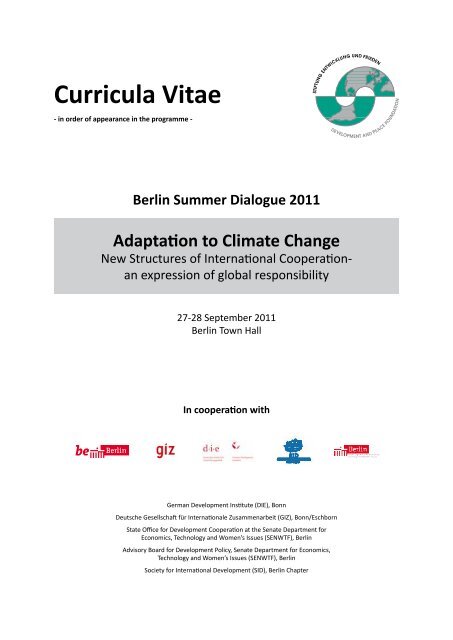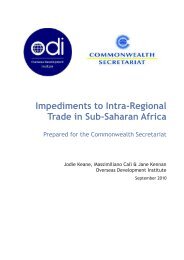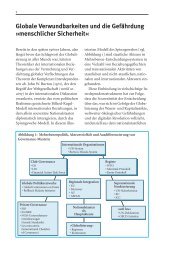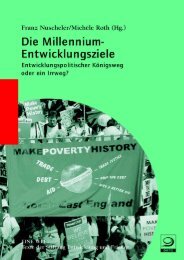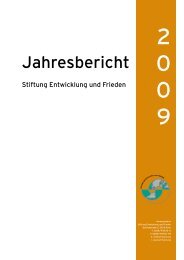Curricula Vitae - sef
Curricula Vitae - sef
Curricula Vitae - sef
Create successful ePaper yourself
Turn your PDF publications into a flip-book with our unique Google optimized e-Paper software.
<strong>Curricula</strong> <strong>Vitae</strong><br />
- in order of appearance in the programme -<br />
Berlin Summer Dialogue 2011<br />
Adaptation to Climate Change<br />
New Structures of International Cooperationan<br />
expression of global responsibility<br />
27-28 September 2011<br />
Berlin Town Hall<br />
In cooperation with<br />
German Development Institute (DIE), Bonn<br />
Deutsche Gesellschaft für Internationale Zusammenarbeit (GIZ), Bonn/Eschborn<br />
State Office for Development Cooperation at the Senate Department for<br />
Economics, Technology and Women’s Issues (SENWTF), Berlin<br />
Advisory Board for Development Policy, Senate Department for Economics,<br />
Technology and Women’s Issues (SENWTF), Berlin<br />
Society for International Development (SID), Berlin Chapter
Karin Kortmann<br />
Parliamentary State Secretary (ret.)<br />
Chairperson of the Executive Committee of the<br />
Development and Peace Foundation (SEF), Bonn<br />
Karin Kortmann was member of the German Federal Parliament from 1998<br />
to 2009. She was Parliamentary State Secretary of the Federal Ministry for<br />
Economic Cooperation and Development (BMZ) from 2005 to 2009.<br />
Karin Kortmann is member of the board of trustees of the Duesseldorf Institute<br />
for Foreign and Security Policy (DIAS) since 2011, member of the advisory board<br />
of the Katholische Friedensstiftung since 2010, Deputy Head of the board of<br />
trustees of the association Exposure and Dialogue Programmes since 2009, and<br />
member of the executive committee of care-Germany since 2005.<br />
She has been member of the board of trustees of the Development and Peace<br />
Foundation (SEF) from 2008-2011, Vice President of the Central Committee of<br />
the German Catholics since 2009, member of the executive committee of the<br />
German Foundation for Peace Research (DSF) from 2004-2010, Chairwoman<br />
of the board of trustees of the German Institute for Development Policy (DIE)<br />
from 2004-2010, and Governor of the German government for the regional<br />
development banks of Africa, Asia, Central America and The Caribbean from<br />
2005 to 2009.<br />
Karin Kortmann studied at University of Mainz and graduated as youth and<br />
community worker.<br />
Klaus Brückner<br />
Director of the GIZ-Representation in Berlin<br />
Deutsche Gesellschaft für Internationale Zusammenarbeit (GIZ) GmbH, Berlin<br />
Member of the Board of Trustees of the<br />
Development and Peace Foundation (SEF)<br />
After 15 years of work for the revenue service Klaus Brückner continued his<br />
professional career in 1984 as a public servant in the State Chancellery of North<br />
Rhine Westphalia in several sectors. From 1992 to 1999 he directed the Division<br />
for International Development Cooperation and then was appointed as Head of<br />
the Prime Minister’s Office (North Rhine Westphalia).<br />
From May 2002 to April 2008 Klaus Brückner worked for German Technical<br />
Cooperation – GTZ – in Pretoria/South Africa as a Programme Manager for the<br />
cooperation with Panafrican Institutions – NEPAD and Pan African Parliament –<br />
and as Senior Advisor to the Presidency of the South African Government.<br />
Since 1st July 2008 Klaus Brückner is the Director of the GIZ-Representation<br />
(formerly GTZ-Representation) in Berlin.<br />
Klaus Brückner has a Diploma in Public Finance.<br />
- 3 -
Dr Fatima Denton<br />
Program Leader<br />
Climate Change Adaptation in Africa<br />
International Development Research Centre (IDRC), Dakar<br />
Dr Fatima Denton leads IDRC Climate Change and Adaptation in Africa<br />
Programme (CCAA). Her research focuses on adaptation strategies that help<br />
Africa’s poor cope with climate change impacts as well as institutional and<br />
governance matters relating to climate adaptation and mitigation. She joined<br />
IDRC in 2006 after working as a senior energy planner with the United Nations<br />
Environment Program (UNEP Risoe) in Denmark. She has also worked with the<br />
energy program of Enda Tiers Monde in Senegal on issues such as sustainable<br />
development and climate change vulnerability and adaptation, as well as food<br />
security, local governance, water, and energy poverty in the Sahel.<br />
Dr Fatima Denton has written articles on energy poverty, gender and energy,<br />
and climate change adaptation. She is a Co-ordinating Lead Author (CLA) for<br />
the Intergovernmental Panel on Climate Change (IPCC) and was also a member<br />
of UNEP’s Scientific Technical Advisory Panel. She is currently a member of the<br />
Independent Science Panel (IPS) of the CGIAR Climate Change and Food Security<br />
Program (CCAF). Fatima holds a PhD in political science and development<br />
studies from the University of Birmingham (UK).<br />
Andreas Jung MP<br />
Member of the German Bundestag and Chair of the<br />
Parliamentary Advisory Council on Sustainable Development, Berlin<br />
Andreas Jung is member of the German Bundestag since 2005 he was reelected<br />
in 2009. He is a member of the Committee on the Environment, Nature<br />
Conservation and Nuclear Safety (rapporteur on climate protection). As well he<br />
is a substitute member of the Committee on Economics and Technology and<br />
Chairman of the Parliamentary Advisory Council on Sustainable Development.<br />
Andreas Jung is member of the Junge Union (youth section of the Christian<br />
Democratic Union) since 1990 and member of the Christian Democratic<br />
Union (CDU) since 1993. Currently he is chairman of the CDU in the county of<br />
Constance (since 2007). Also he is a member of the executive committee of the<br />
Baden-Württemberg CDU since 2003 and since 2005 an elected member of the<br />
CDU executive committee in the county of Constance.<br />
Andreas Jung is an admitted lawyer, he studied at Freiburg University.<br />
- 4 -
Sven Harmeling<br />
Head of Team<br />
International Climate Policy<br />
Germanwatch, Bonn<br />
Sven Harmeling is holding the position Head of the International Climate Policy<br />
Team and has been working at Germanwatch since more than six years. He is<br />
responsible for coordinating and overseeing a number of policy research and<br />
advisory projects on issues related to the UNFCCC process, adaptation and<br />
climate finance as well as linkages between food security and climate change.<br />
He is currently serving as speaker of the climate change working group of the<br />
German Association of Development NGOs (VENRO) and is co-chair of the<br />
adaptation working group of the Climate Action Network International. As an<br />
active observer he has attended numerous UNFCCC negotiations.<br />
He holds a Diploma in Geography, Political Science and Environmental<br />
Economics from the University of Bonn. He is the author of numerous<br />
publications related to adaptation and adaptation finance.<br />
Dr Keith Alverson<br />
Coordinator<br />
Climate Change Adaptation and Terrestrial Ecosystems Branch<br />
United Nations Environment Programme (UNEP), Nairobi<br />
Dr Keith Alverson is the newly appointed (July, 2011) Coordinator of the Climate<br />
Change Adaptation and Terrestrial Ecosystems Branch of the Division on<br />
Environmental Policy Implementation at the UN Environment Program (UNEP)<br />
in Nairobi, Kenya. In this role he coordinates, inter alia, UNEP’s Ecosystems<br />
Based Adaptation Climate Change program of work and the Global Climate<br />
Change Adaptation Network. From 2004-2011, Dr Keith Alverson served as Head<br />
of Ocean Observations and Services at the Intergovernmental Oceanographic<br />
Commission of UNESCO and director of the Global Ocean Observing System,<br />
based in Paris, France. Prior to 2004, he was director of the International<br />
Geosphere Biosphere Programme’s core project Past Global Changes (PAGES) in<br />
Bern, Switzerland.<br />
Dr Keith Alverson has served on a number of high level scientific panels<br />
including presidency of the International Commission for Climate of the<br />
International Association for Meteorology and Atmospheric Sciences and Chair<br />
of the United Nations Interagency Coordination and Planning Committee for<br />
Earth Observations.<br />
Dr Keith Alverson holds a PhD in Earth, Atmospheric and Planetary Sciences<br />
from the Massachusetts Institute of Technology (MIT).<br />
- 5 -
Dr Achim Brunnengräber<br />
Lecturer<br />
Department of Political and Social Sciences, Freie Universität Berlin<br />
and Visiting Professor in the Department of International Politics<br />
and School of International Studies (ZIS) at Dresden University of Technology<br />
Dr Achim Brunnengräber is a Visiting Professor at the Technische Universität<br />
Dresden, Chair for International Politics, and Associated Professor (Privatdozent)<br />
in Political Science at the Freie Universität Berlin.<br />
He has a long-standing expertise in climate and energy policy research as well<br />
as in socio-ecological research. In particular, his work focuses on: Energy and<br />
climate policy in Germany, in the EU and world-wide; implementation of the<br />
Kyoto instruments, global governance, multi-level governance, questions of<br />
global democracy, international and transnational civil society and global public<br />
policy networks (GPPN).<br />
Dr Achim Brunnengräber holds a PhD in Political Science from the Freie<br />
Universität Berlin and a Diploma in Political Development Science from the<br />
Universität Bremen.<br />
He is author of several publications, see e.g. A. Brunnengräber (ed.):<br />
Zivilisierung des Klimaregimes. NGOs und soziale Bewegungen als Akteure der<br />
nationalen, europäischen und internationalen Politik, 2011 or together with<br />
Elmar Altvater (eds.): After Cancún: Climate Governance or Climate Conflicts,<br />
2011, both of them Wiesbaden, VS Verlag für Sozialwissenschaften, VS Research<br />
Energiepolitik und Klimaschutz.<br />
Dr Balgis Osman-Elasha<br />
Climate Change Adaptation Expert<br />
Compliance and Safe Guards Division<br />
African Development Bank (AfDB), Tunis<br />
Dr Balgis Osman-Elasha is Climate Change Adaptation Expert at the Compliance<br />
and Safe Guards Division at the African Development Bank (AfDB) since 2009.<br />
She has ten years experience in climate change issues with special focus on<br />
vulnerability and adaptation assessment related to African countries. Currently<br />
her work focuses on sustainable development, with special emphasis on human<br />
dimension of global environmental changes. During the last ten years she has<br />
served as a leading member in one of the largest professional network in the<br />
area of conservation and sustainable development: the Inter-governmental<br />
Panel on Climate Change (IPCC).<br />
Before, she was Senior Researcher at the Climate Change Unit of the Higher<br />
Council for Environment and Natural Resources (HCENR). Her research focuses<br />
on vulnerability and adaptation assessment in drought-prone areas in Sudan.<br />
She holds a PhD in Forestry Science, a Master in Environmental Science and a<br />
Bachelor of Science (B.Sc.) with Honour in Forestry and Agricultural Science.<br />
She has reviewed a number of scientific papers to Elsevier and other highly<br />
reputable journals. Ms Osman-Elasha is a Guest Editor to a number of scientific<br />
Journals. Her recent publication is Climate Change: Global Risks, Challenges<br />
and Decisions (eds. Katherine Richardson, Will Steffen and Diana Liverman),<br />
Cambridge, 2011.<br />
- 6 -
Remy Paris<br />
Head of section<br />
Environment and Sustainable Development<br />
Organisation for Economic Co-operation and Development (OECD), Paris<br />
Remy Paris is Head of Section for Environment and Sustainable Development<br />
at OECD since 1998. He is managing and co-ordinating the work of the<br />
Development Assistance Committee (DAC) Expert Group on Environment.<br />
His work program focuses on integrating the climate change, biodiversity and<br />
desertification conventions within aid programs, analysing the linkages between<br />
poverty reduction and natural resource management and mainstreaming<br />
sustainable development issues in aid agencies.<br />
In 1997, he was at the Aid Review Division responsible for conducting the<br />
Review of Canada’s aid programme, as part of the DAC’s regular “Peer Review<br />
Process” and for conducting the review of Finland’s development co-operation<br />
programme in Nicaragua. From 1994-1997, he led the work of the special OECD<br />
Task Force at the Conflict Prevention and Reconstruction Unit responsible for<br />
the formulation of policy guidelines for aid programmes after conflicts and<br />
humanitarian emergencies, and the development of strategies to address the<br />
economic and political causes and consequences of conflict. Before he worked<br />
in the Graduate Young Professionals Programme at the Asian Development Bank<br />
in Manila, Philippines (1989-1994).<br />
Remy Paris holds an MA in International Relations from the International<br />
University of Japan, Niigata and a MSc (Hons) and BSc (Hons) in Economics from<br />
the London School of Economics and Political Science (LSE), UK.<br />
Principal recent publications include: OECD Guidance on integrating climate<br />
change adaptation into development co-operation.<br />
Professor Uwe Holtz<br />
Institute for Political Science and Sociology<br />
University of Bonn<br />
Member of the Board of Trustees of the<br />
Development and Peace Foundation (SEF)<br />
Professor Uwe Holtz is a lecturer at the Institute for Political Science and<br />
Sociology of Bonn University and a Senior Fellow at the University’s Center for<br />
Development Research. His teaching, research and publication areas include<br />
development policy and European integration, democracy, human rights and<br />
sustainability.<br />
He has consulted for and advised several national and international<br />
organisations and institutions on development issues, i. a. the European Union<br />
and the United Nations, served on several boards, e.g. the International Food<br />
Policy Research Institute, Washington, D.C. Professor Uwe Holtz is a founding<br />
member of the Development and Peace Foundation (1986).<br />
As a member of the German Bundestag from 1972 to 1994, he chaired its<br />
parliamentary committee on economic co-operation and development for 20<br />
years. From 1973 to 1995 he has been a member of the Parliamentary Assembly<br />
of the Council of Europe, Strasbourg (France).<br />
He holds a PhD and a Master’s degree from the University of Cologne.<br />
- 7 -
Dr Hermann Fickinger<br />
Director<br />
International Climate Initiative Programme Office<br />
Gesellschaft für Internationale Zusammenarbeit (GIZ), Berlin<br />
Dr Hermann Fickinger is the current head of the Program Office of the<br />
International Climate Initiative (ICI) in Berlin. The Programme Office is run<br />
by the Deutsche Gesellschaft für Internationale Zusammenarbeit (GIZ) and<br />
is supporting the Federal Ministry for Environment, Nature Conservation<br />
and Nuclear Safety (BMU) in implementing the ICI. Since 2008, ICI has been<br />
financing climate projects in developing and newly industrialised countries, as<br />
well as countries in transition. As an innovative mechanism the ICI effectively<br />
contributes towards emission reduction and adaptation to climate change.<br />
Before joining the ICI, Dr Hermann Fickinger was GIZ Program Director of the<br />
German Pacific Regional Program on Climate Change in the Pacific Island region<br />
from 2008 to 2011. Prior to that, Dr Hermann Fickinger has worked for GIZ<br />
(former GTZ) in different programs and positions in developing countries in Sub-<br />
Saharan Africa and Morocco since 1992.<br />
Dr Hermann Fickinger holds a PhD in Tropical Forestry from the University of<br />
Göttingen.<br />
Dieter Ernst<br />
State Secretary (ret.)<br />
Member of the board<br />
RWL Water Group, Berlin<br />
Dieter Ernst joined RWL Water in 2011, he is representing the group in Europe/<br />
Mena. In 1999, he became a member of the board of Berlin Wasser Holding in<br />
charge for the international project development of the group, continuing this<br />
responsibility 2003 as CEO of Berlinwasser International AG.<br />
Dieter Ernst studied law and has practiced as public prosecutor. He worked<br />
in the board of the district of Tiergarten, Berlin, in various responsibilities for<br />
ten years. From 1996 to 1999, he acted as state secretary in the ministry of<br />
economics of the State of Berlin.<br />
Beside he is volunteering for various organisations like German Asia-Pacific<br />
Association (OAV, vice chairman), German Near Middle East Association<br />
(NUMOV, Member of the board), Federation of German Industry (BDI, chairman<br />
of the “Committee on Development Policy), European Water Partnership (EWP,<br />
member of the board), German Water Partnership (GWP, member of the board),<br />
and Helmholtz Society (UFZ, member of the supervisory board).<br />
- 8 -
Dr Joseph Awetori Yaro<br />
Senior Lecturer<br />
University of Ghana, Accra<br />
Co-author of Ghana’s National Climate Change Adaptation Strategy (NCCAS)<br />
Dr Joseph Awetori Yaro is a Senior Lecturer of the Department of Geography<br />
at the University of Ghana. He is also a visiting scholar at the Department of<br />
Human Geography during the annual Summer School program at the University<br />
of Oslo, Norway.<br />
His main research interest concerns sustainable development in rural Africa.<br />
He teaches courses in Rural Development, Research Methods, Philosophy<br />
in Geography, and Resource Analysis. He is currently working on issues of<br />
land rights vulnerabilities; food price rises and food insecurity; and climate<br />
change adaptations. Dr Joseph Yaro has carried out consultancies and research<br />
projects sponsored by the Ministry of Lands, Forestry and Mines, the Institute<br />
of Statistical, Social and Economic Research, the University of Ghana Research<br />
and Conferences Grants, the World Bank; and the University of Oslo/Norwegian<br />
Research Council.<br />
Dr Joseph Yaro holds a PhD in Human Geography and a MPhil from the<br />
University of Oslo, and a BA (Hons) First Class in Geography and Resource<br />
Development from the University of Ghana.<br />
His recent publications are: Poverty and land degradation linkages in the<br />
Developing World (Yaro. J. A. and Hesselberg J.), Ghana Journal of Geography<br />
Vol. 2. Pp. 25-46, 2010; Customary tenure systems under siege: contemporary<br />
access to land in Northern Ghana (Yaro, J. A.). Geojournal: Vol. 75. Pp. 199-214,<br />
2010.<br />
Dr Imme Scholz<br />
Deputy Director<br />
German Development Institute (DIE), Bonn<br />
Dr Scholz is the deputy director of the Deutsches Institut für Entwicklungspolitik/<br />
German Development Institute (DIE) in Bonn. Between 2002 and 2009, she<br />
headed the environment department at DIE where she established new<br />
research programs in order to study (1) the linkages between climate change<br />
and development, (2) how developing countries engage in negotiations for<br />
global environmental agreements, and (3) the functions of development policy<br />
in this new setting. She started her career at DIE in 1992 analysing issues at the<br />
interface between trade and environment.<br />
From 1999 to 2002, Dr Scholz obtained experience in practical development<br />
cooperation working as an environmental policy advisor for the Deutsche<br />
Gesellschaft für Technische Zusammenarbeit (GTZ) in the Brazilian Amazon<br />
(1999-2002), in the context of the Pilot Programme for the Protection of the<br />
Brazilian Rainforest (PPG7).<br />
Dr Imme Scholz holds a degree in sociology from the Freie Universität Berlin<br />
where she also obtained her doctoral degree in 1999. She is a member of<br />
the North-South Advisory Council of the Heinrich Böll Foundation and of the<br />
Chamber for Sustainable Development of the Protestant Church in Germany.<br />
- 9 -
Aly Abou-Sabaa<br />
Chairman<br />
Coordination Committee on Climate Change<br />
African Development Bank (AfDB), Tunis<br />
Aly Abou-Sabaa is Chairman of the Coordination Committee on Climate Change<br />
of the African Development Bank.<br />
He has over 28 years of diverse experience in the fields of management,<br />
civil engineering, project management, infra-structural development, water<br />
resources management of large and small scale civil engineering and agriculture<br />
projects as well as agriculture investment promotion and implementation<br />
in 40 countries in Africa, Asia, and USA of which 19 years are with African<br />
Development Bank working in various capacities.<br />
Aly Abou-Sabaa holds an M.Sc. in Civil Engineering from Montana State<br />
University, USA (1989) and a B.Sc. in Civil Engineering from Alexandria<br />
University, Egypt (1983).<br />
Frank Fass-Metz<br />
Head of Division<br />
Climate Policy and Climate Financing<br />
Federal Ministry for Economic Cooperation and Development (BMZ), Bonn<br />
Frank Fass-Metz is Head of Division Climate Policy and Climate Finance since<br />
February 2009 and since 2008 Head of Division Environment and Sustainable<br />
Use of Natural Resources of the Federal Ministry for Economic Cooperation and<br />
Development (BMZ).<br />
He is a council member for Germany of the Global Environmental Facility<br />
(GEF). As well he is a member of the Trust Fund Committees for the Climate<br />
Investment Funds since October 2008. Frank Fass-Metz was a member of the<br />
Board of the Adaptation Fund in 2008 (UNFCCC), and a member of the German<br />
Delegation to COP 14, 15, 16, AWG in 2008-2010.<br />
Before, Frank Fass-Metz was Deputy Head of Division for Bilateral Cooperation<br />
with South America of the Federal Ministry for Economic Cooperation and<br />
Development (BMZ) from 2004 to 2008.<br />
Frank Fass-Metz studied Economics (Diplom-Volkswirt) at Hamburg University,<br />
with specialisation in development economics and international development.<br />
- 10 -
Pieter Pauw<br />
Researcher<br />
Department of Environmental Policy and Management of Natural Resources<br />
German Development Institute (DIE), Bonn<br />
Pieter Pauw is a researcher at the DIE since July 2011. His research focuses on<br />
the role of the private sector in financing adaptation. From 2007-2011, Pieter<br />
Pauw had a position at the Institute for Environmental Studies (IVM), where he<br />
worked on numerous projects on climate change impacts, adaptation strategies,<br />
climate finance and development studies. A lot of this work was carried out in<br />
African countries, for organisations including the World Bank, WWF and the<br />
Netherlands Development Finance Company (FMO).<br />
During this position and his studies, he was a member of various committees<br />
in environmental education and development cooperation in the Netherlands.<br />
Results of his research were presented at many conferences including the<br />
EU soil conference (2004), Schokland Conferences on adaptation to climate<br />
change in developing countries (2009, 2010), the COP 15 Climate Summit in<br />
Copenhagen (2009) and the WWF Campo Summit in Yaoundé (2010).<br />
Pieter Pauw holds an MSc in Environment & Resource Management from the<br />
VU University in Amsterdam.<br />
Belynda Petrie<br />
CEO<br />
OneWorld Sustainable Investments, Johannesburg<br />
Belynda Petrie is an expert and leading figure in regional and international<br />
climate change adaptation and mitigation, energy, socioeconomic development<br />
and human security. Her strength lies in large measure in her ability to<br />
bring together multidisciplinary teams, often with public and private sector<br />
stakeholders. She has led several medium- to large-scale projects, including the<br />
Southern African Regional Climate Change Programme (RCCP) funded by the<br />
UK’s Department for International Development —a vast programme that aims<br />
to help equip the region’s leaders, decision makers, scientists, economists and<br />
other experts to adapt to the impacts of climate variability and change.<br />
Belynda Petrie has pioneered a systematic analysis approach, drawing on<br />
economic, social and ecological learnings in the search for solid sustainability<br />
solutions to complex transboundary issues. She sees stakeholder engagement<br />
as a pillar of all attempts to find durable and resilient solutions to the complex<br />
challenges facing Southern African leaders. She has been instrumental in<br />
facilitating the shaping of a science-policy-institutional–finance dialogue, which<br />
has become the RCCP framework in developing practicable responses to key<br />
climate change issues. Other projects include the development of a Uganda<br />
water resources climate change vulnerability assessment and strategy, the<br />
internationally acclaimed Western Cape Climate Change Strategy and Action<br />
Plan (South Africa), the Ibhubesi Gas Field development project (west coast of<br />
South Africa), and the restructuring of the Datatec International Group.<br />
- 11 -
Dr Michèle Roth<br />
Executive Director<br />
Development and Peace Foundation (SEF), Bonn<br />
Dr Michèle Roth has acted as the Executive Director of the Development and<br />
Peace Foundation (SEF) since 2005. Before, she was Deputy Executive Director<br />
(2003-2004) and Research and Programme Coordinator (1998-2003) of the<br />
Development and Peace Foundation (SEF).<br />
Dr Michèle Roth has been treasurer of the Global Policy Forum Europe since<br />
2004.<br />
She obtained her doctoral degree in 2003 and a MA in Political Science, History,<br />
and German Literature in 1998 both from the University of Bonn.<br />
Rosário Bento Pais<br />
Head of Unit Adaption<br />
DG Climate Action<br />
European Commission, Brussels<br />
Rosário Bento Pais took the responsibility for the Unit on Adaptation to Climate<br />
change both at international and EU level since the creation of DG CLIMA.<br />
From October 2007, she worked as Deputy-Head of Unit of the International<br />
negotiations on Climate Change Unit. Before, she was a member of the cabinet<br />
of Mariann Fischer Boel, responsible for the Common Agricultural Policy<br />
(CAP), competition policy (excluding state aid), infringement procedures, legal<br />
service, environment, internal market and services, transport, energy and<br />
outermost regions. From 2002 to 2004, she worked as an administrator in DG<br />
Environment’s department of international agreements and trade: working<br />
on legal and institutional affairs and international negotiations. Before, she<br />
was councillor and assistant to the deputy permanent representative at the<br />
Portuguese Permanent Representation to the EU in Brussels and was seconded<br />
as a national expert to DG Environment’s department of international affairs,<br />
trade and environment where she dealt with bilateral agreements, was OECD<br />
desk officer, and gave legal advice on international negotiations from 2000 to<br />
2002.<br />
Rosário Bento Pais worked from 1996 to 2002 for the Portuguese Ministry<br />
of Foreign Affairs. From 1996 to 1999, she was chancellor at the Portuguese<br />
Embassy in Luxembourg. Before, she held a Robert Schumann Scholarship at the<br />
European Parliament, Luxembourg (1995-1996).<br />
Rosário Bento Pais obtained a masters in international relations from the<br />
Universidade do Minho, Portugal (1995), and a masters in European judicial<br />
studies from the European Institute of Public Administration, Maastricht (1998).<br />
- 12 -


